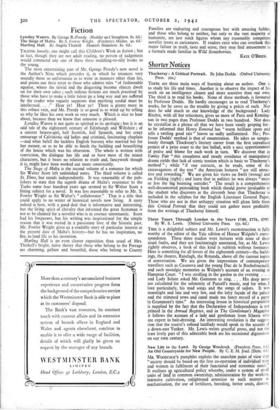Fiction
Lyndley Waters. By George R..Preedy. (Hodder anl Stoughton. 8s. 6d.) The Siege of Malta. By S. Fowler Wright. (Frederick Muller. 9s. 6d.) Marling Hall. By Angela Thirkell. (Hamish Hamilton. 8s. 6d.)
TALKING loosely, one might call this Children's Week in fiction ; but in fact, though they are not adult reading, no person of judgement would commend any one of these three middling-to-silly books to the young.
The most entertaining part of Mr. George Preedy's new novel is the Author's Note which precedes it, in which he trounces very soundly those so unfortunate as to write in manners other than his, and points out their error to those who admire tales " of fashionable squalor, where the trivial and the disgusting become objects dwelt on for their own sakes ; such tedious fictions are much practised by those who have to make a little talent go a long way and are suffered by the reader who vaguely supposes that anything sordid must be intellectual. . . ." Hear ye! Hear ye! There is plenty more in this robust vein, and Mr. Preedy is so good as to wind up by telling us why he likes his own work so very much. Which is nice to hear about, because then we know that someone is pleased.
Lyndley Waters is not quite as spirited as its apologia ; but it is an odd tale of the eighteenth century of Edinburgh and Wiltshire ; of a sinister heiress-girl, half Scottish, half Spanish, and her crazy entourage of Calvinistic old ladies and criminal, fascinating chaplain —and what befell the luckless English baronel, who married her for her money, so as to be able to finish the building and beautifying of the house which was his obsession. The whole is written with conviction, the dialogue has life and so have most of the minor characters, but it bears no relation to truth and, fancywork though it is, might have been worked out more consistently.
The Siege of Malta is the second volume of a romance for which Sir Walter Scott left unfinished notes. The third volume is called St. Elmo, but stands independently. It was reasonable of the pub- lishers to state that the superb drama of Malta's resistance to the Turks some four hundred years ago seemed to Sir Walter Scott a fitting subject for a novel. It was less reasonable to refer to Mr. S. Fowler Wright as Sir Walter's " collaborator." That is a title that could apply to no writer. of historical novels now living. A story indeed is here, with a good deal that is informative and interesting, but the living spirit of chivalry that informed the great Scotsman is not to be claimed for a novelist who is in essence unromantic. Scott had his longueurs, but his writing was inspirational for the simple reason that it was rooted in a passionate love of the historic past. Mr. Fowler Wright gives us a readable story of particular interest at the present date of Malta's history—but he has no inspiration, no fire, to lend life to his invention.
Marling Hall is an even clearer exposition than usual of Mrs. Thirkell's bright, naive theory that those who belong to the Peerage are charming, gallant and beautiful, those who belong to County Families are endearing and courageous but with amusing foibles, and those who belong to neither, but only to the vast majority of humanity, are just stock figures whom any reasonably competent novelist treats as caricatures. If readers exist who can overlook this major failure in truth, taste and sense, they may find amusement in a formula made familiar in Wild Strawberries.
KATE O'BRIEN.


























 Previous page
Previous page